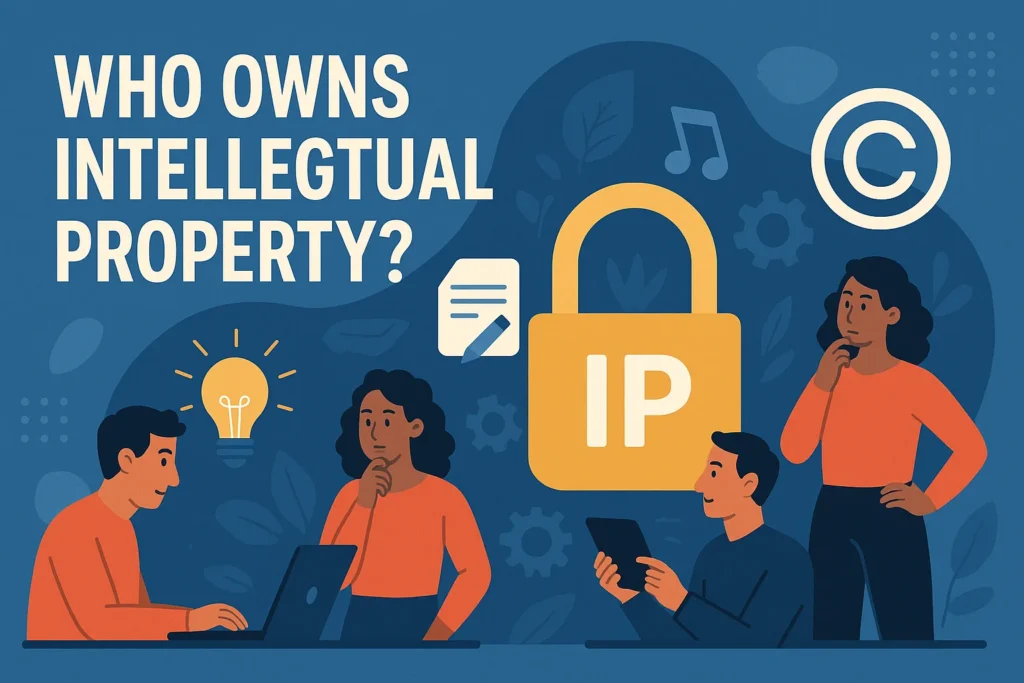Who Owns Intellectual Property?
Intellectual property is everywhere — from the logo on your favorite brand to the code behind a mobile app. But here’s the big question: who really owns intellectual property once it’s created? Who Owns Intellectual Property? If you’ve ever designed a product, written an article, or worked on a project with others, this question isn’t just academic — it’s legal. In this guide, we’ll unpack what intellectual property is, who typically owns it, and how to make sure your rights are protected. Whether you’re an individual or a business, services like thefirstcallsol can help you navigate the complexities of IP ownership in Pakistan. What Is Intellectual Property (IP) Anyway? Intellectual property or IP, refers to the rights you hold over things you create using your mind. This includes: These aren’t physical objects — they’re intangible assets — but they can be more valuable than anything you can touch. Who Owns Intellectual Property by Default? Here’s the basic principle: the person who creates the work usually owns it. So, if you write a song, design a logo, or build an app on your own — you’re the legal owner of that IP. But like most things in law, there are exceptions. Ownership can change based on contracts, employment status, or collaboration terms. Let’s explore the main situations where IP ownership shifts. IP Created as an Employee: Company vs. Creator Working for a Company? Read the Fine Print If you’re employed by a business and your job involves creating content, writing code, or inventing solutions — the company likely owns that work. This is common in full-time jobs where you’re paid to create as part of your role. What If You Did It After Hours? Let’s say you build a mobile game at home after work hours. Does your employer still own it? The answer depends on a few factors: That’s where IP gets tricky. To protect your rights, review your employment agreement carefully — or ask legal professionals like thefirstcallsol to interpret it for you. Freelancers & Independent Contractors: Who Owns the Final Product? Many people assume that paying a freelancer means buying their work outright. But legally, that’s not how it works. Unless a written agreement says otherwise, the freelancer owns the IP, even if the client paid for the service. Example: You pay a graphic designer to create a brand logo. If you don’t sign an IP transfer contract, the designer still legally owns the logo — and you only have permission to use it. Quick Tip: Always include an IP clause in your freelance contracts. It avoids future misunderstandings and ensures you’re legally protected. What Happens When IP Is Created by a Team? If more than one person contributes to the same piece of work, it can lead to joint ownership. Equal Creators, Shared Rights In joint IP ownership: To avoid disputes, co-creators should sign an agreement that defines who owns what. For this, many Pakistani startups and creatives rely on thefirstcallsol to draft partnership-friendly IP terms. Startups and Company IP: What Belongs to the Business? When you’re running a startup, ownership of creative work isn’t always obvious. Did the founders come up with the brand name? Did a cofounder design the product? Did an intern build the website? Clarify Ownership from Day One If you want to prevent legal chaos later, set clear rules at the beginning. Every stakeholder should know: Many investors also demand clear proof that the company owns its IP. It’s not just about creativity — it’s about legal structure, and that’s something thefirstcallsol helps startups handle with confidence. IP Licenses vs. Full Ownership: What’s the Difference? You can use intellectual property without owning it, as long as you have permission. That’s what licensing is for. License = Limited Rights When you license IP, you get permission to use it under certain terms: For instance, when you stream music or use stock photos, you’re not buying the IP — you’re licensing it. Misusing licensed material can lead to copyright claims or legal penalties. Can You Transfer Intellectual Property? Yes, IP is just like other forms of property — it can be sold, gifted, inherited, or transferred to another person or company. This process is called an IP assignment, and it must be done in writing. The document should clearly describe the: Without a proper agreement, any claimed transfer may not be legally valid. To ensure it’s done right, many creators turn to experienced legal advisors like thefirstcallsol who provide tailored support for IP assignments in Pakistan. Final Thoughts: Know Your Rights and Protect Your Creations In a world where ideas move faster than ever, intellectual property is one of your most valuable assets. But owning it isn’t always simple. Whether you’re an employee, freelancer, founder, or investor — understanding IP ownership is critical. It affects your creative control, your business revenue, and even your reputation. The best defense? Written contracts, clear communication, and expert legal support. If you’re in Pakistan and need help managing, registering, or transferring IP, the team at thefirstcallsol is ready to guide you. FAQs
Who Owns Intellectual Property? Read More »


